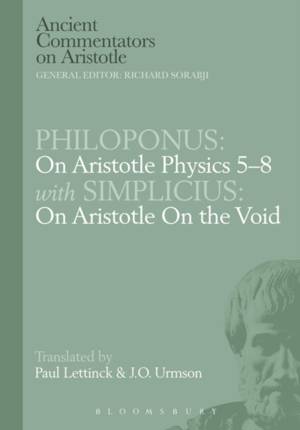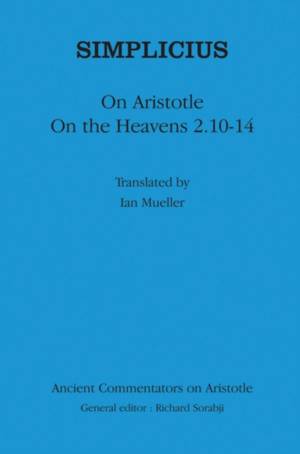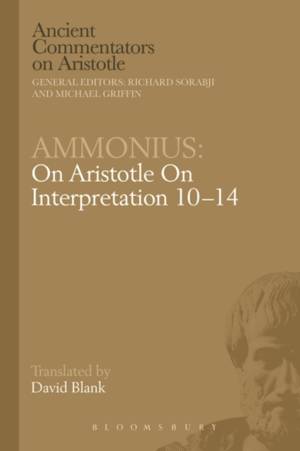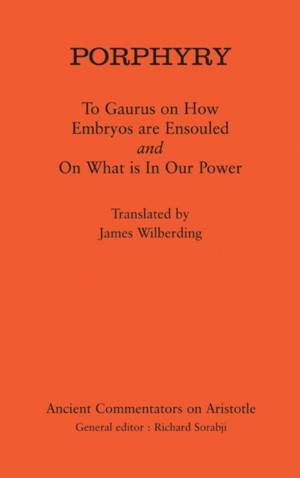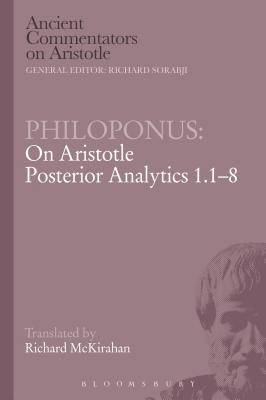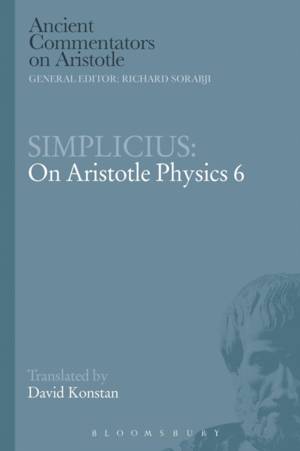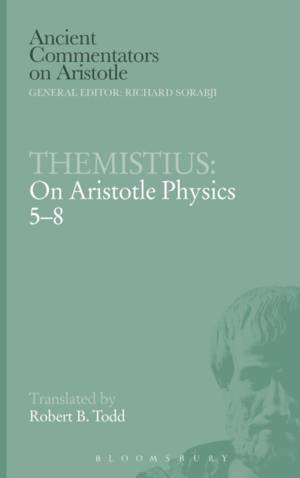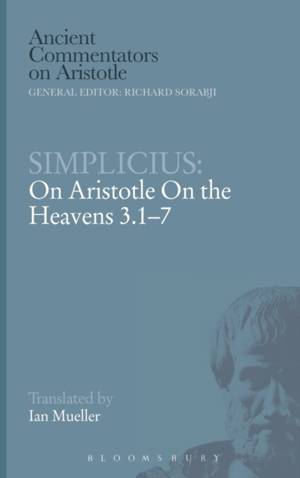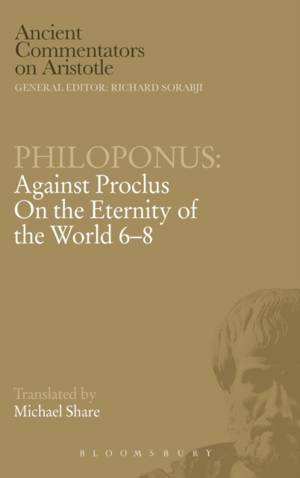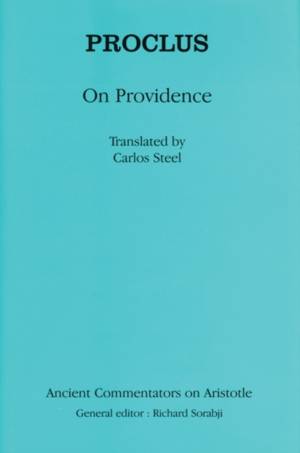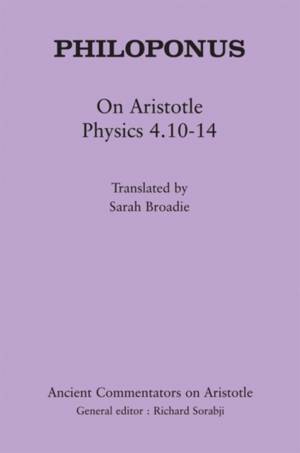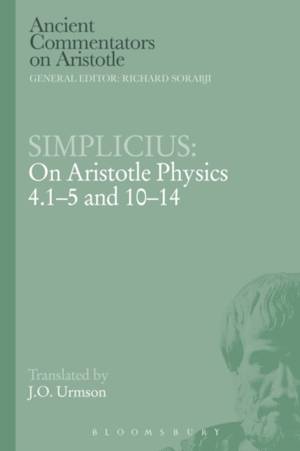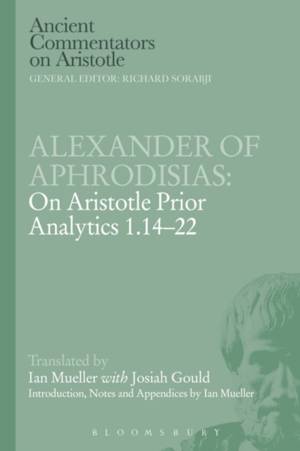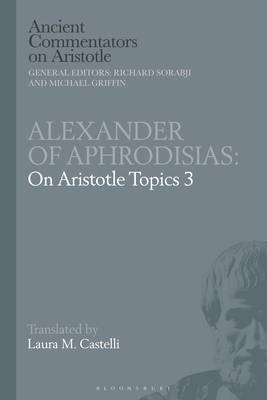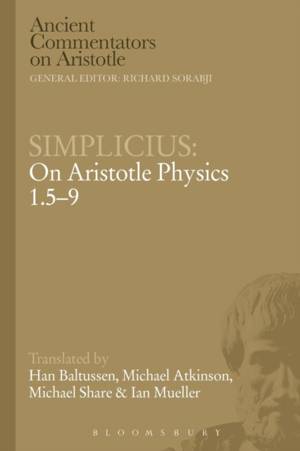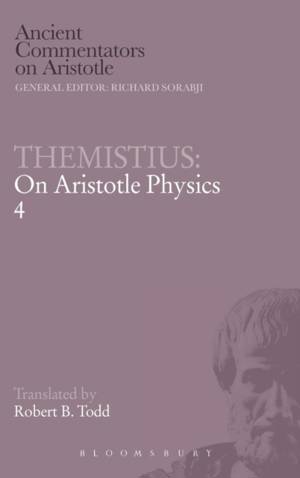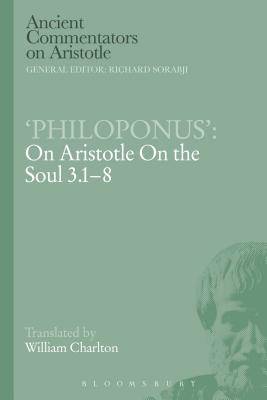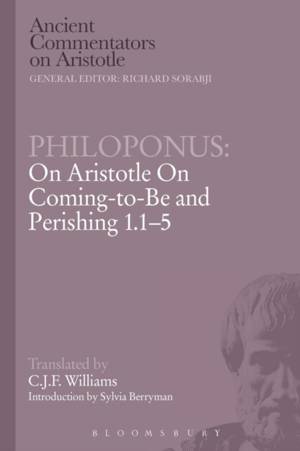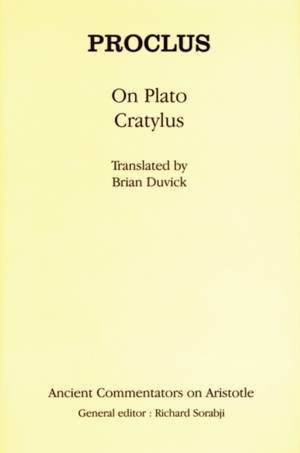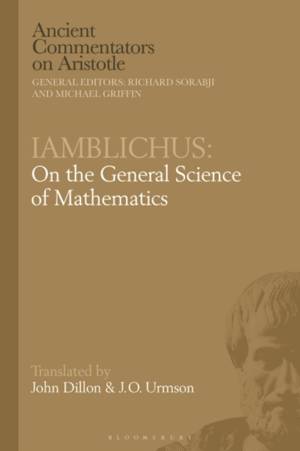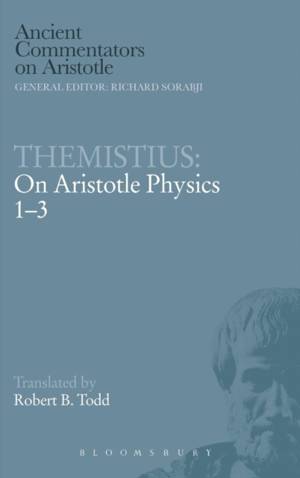
- Retrait gratuit dans votre magasin Club
- 7.000.000 titres dans notre catalogue
- Payer en toute sécurité
- Toujours un magasin près de chez vous
- Retrait gratuit dans votre magasin Club
- 7.000.0000 titres dans notre catalogue
- Payer en toute sécurité
- Toujours un magasin près de chez vous
Résultats pour "Ancient Commentators on Aristotle"
-
Philoponus: On Aristotle Physics 5-8 with Simplicius: On Aristotle on the Void
J O Urmson, Paul Lettinck
- Livre broché | Anglais | Ancient Commentators on Aristotle
- Paul Lettinck has restored a lost text of Philoponus by translating it for the first time from Arabic (only limited fragments have survived in the ori... Savoir plus
88,45 €Livraison 2 à 3 semaines88,45 €Livraison 2 à 3 semaines -
Priscian: Answers to King Khosroes of Persia
- Livre relié | Anglais | Ancient Commentators on Aristotle
- Priscian of Lydia was one of the Athenian philosophers who took refuge in 531 AD with King Khosroes I of Persia, after the Christian Emperor Justinian... Savoir plus
296,95 €Livraison 2 à 3 semaines296,95 €Livraison 2 à 3 semaines -
Simplicius: On Aristotle on the Heavens 2.10-14
Simplicius
- Livre broché | Anglais | Ancient Commentators on Aristotle
- Aristotle believed that the outermost stars are carried round us on a transparent sphere. There are directions in the universe and a preferred directi... Savoir plus
88,45 €Livraison 2 à 3 semaines88,45 €Livraison 2 à 3 semaines -
Ammonius: On Aristotle on Interpretation 10-14
- Livre relié | Anglais | Ancient Commentators on Aristotle
- This is the final part of the translation in this series of Ammonius' commentary on Aristotle "On Interpretation." This is the only commentary written... Savoir plus
97,95 €Livraison 1 à 2 semaines97,95 €Livraison 1 à 2 semaines -
Porphyry
Porphyry
- Livre relié | Anglais | Ancient Commentators on Aristotle
- Concerning embryos, Porphyry takes an original view on issues that had been left undecided by his teacher Plotinus and earlier by the doctor Galen. Wh... Savoir plus
373,45 €Livraison 2 à 3 semaines373,45 €Livraison 2 à 3 semaines -
Philoponus: On Aristotle Posterior Analytics 1.1-8
Philoponus
- Livre broché | Anglais | Ancient Commentators on Aristotle
- Aristotle's Posterior Analytics elaborates for the first time in the history of Western philosophy the notions of science and the requirements for the... Savoir plus
88,45 €Livraison 2 à 3 semaines88,45 €Livraison 2 à 3 semaines -
Simplicius: On Aristotle Physics 6
David Konstan
- Livre broché | Anglais | Ancient Commentators on Aristotle
- Book Six of Aristotle's Physics , which concerns the continuum, shows Aristotle at his best. It contains his attack on atomism which forced subsequent... Savoir plus
88,45 €Livraison 2 à 3 semaines88,45 €Livraison 2 à 3 semaines -
Themistius: On Aristotle Physics 5-8
Themistius
- Livre relié | Anglais | Ancient Commentators on Aristotle
- Themistius' treatment of Books 5-8 of Aristotle's Physics shows this commentator's capacity to identify, isolate and discuss the core ideas in Aristot... Savoir plus
373,45 €Livraison 2 à 3 semaines373,45 €Livraison 2 à 3 semaines -
Simplicius: On Aristotle on the Heavens 3.1-7
Simplicius
- Livre relié | Anglais | Ancient Commentators on Aristotle
- The subject of Aristotle's On the Heavens , Books 3-4, is the four elements of earth, air, fire and water, which exist below the heavens. Book 3, in c... Savoir plus
209,95 €Livraison 1 à 2 semaines209,95 €Livraison 1 à 2 semaines -
Philoponus
Philoponus
- Livre relié | Anglais | Ancient Commentators on Aristotle
- In On The Soul 2.1-6, Aristotle differs from Plato in his account of the soul, by tying it to the body. The soul is the life-manifesting capacities th... Savoir plus
139,95 €Livraison sous 1 à 4 semaines139,95 €Livraison sous 1 à 4 semaines -
Philoponus
Philoponus
- Livre relié | Anglais | Ancient Commentators on Aristotle
- This is one of the most interesting of all post-Aristotelian Greek philosophical texts, written at a crucial moment in the defeat of paganism by Chris... Savoir plus
139,95 €Livraison sous 1 à 4 semaines139,95 €Livraison sous 1 à 4 semaines -
Proclus: On Providence
Proclus
- Livre broché | Anglais | Ancient Commentators on Aristotle
- 'The universe is, as it were, one machine, wherein the celestial spheres are analogous to the interlocking wheels and the particular beings are like t... Savoir plus
88,45 €Livraison 2 à 3 semaines88,45 €Livraison 2 à 3 semaines -
Philoponus: On Aristotle Physics 4.10-14
Philoponus
- Livre broché | Anglais | Ancient Commentators on Aristotle
- Philoponus' commentary on the last part of Aristotle's Physics Book 4 does not offer major alternatives to Aristotle's science, as did his commentary ... Savoir plus
88,45 €Livraison 2 à 3 semaines88,45 €Livraison 2 à 3 semaines -
Simplicius: On Aristotle Physics 4.1-5 and 10-14
J O Urmson
- Livre broché | Anglais | Ancient Commentators on Aristotle
- This companion to J. O. Urmson's translation in the same series of Simplicius' Corollaries on Place and Time contains Simplicius' commentary on the ch... Savoir plus
88,45 €Livraison 2 à 3 semaines88,45 €Livraison 2 à 3 semaines -
Alexander of Aphrodisias: On Aristotle Prior Analytics 1.14-22
Ian Mueller
- Livre broché | Anglais | Ancient Commentators on Aristotle
- The commentary of Alexander of Aphrodisias on Aristotle's Prior Analytics 1.8-22 is a very important text, being the main ancient commentary with chap... Savoir plus
88,45 €Livraison 2 à 3 semaines88,45 €Livraison 2 à 3 semaines -
Alexander of Aphrodisias: On Aristotle Topics 3
- Livre broché | Anglais | Ancient Commentators on Aristotle
- Aristotle's Topics is a handbook for dialectic, i.e. the exercise for philosophical debates between a questioner and a respondent. Alexander takes the... Savoir plus
67,95 €Livraison 2 à 3 semaines67,95 €Livraison 2 à 3 semaines -
Simplicius: On Aristotle Physics 1.5-9
- Livre broché | Anglais | Ancient Commentators on Aristotle
- Simplicius' greatest contribution in his commentary on Aristotle on Physics 1.5-9 lies in his treatment of matter. The sixth-century philosopher start... Savoir plus
88,45 €Livraison 2 à 3 semaines88,45 €Livraison 2 à 3 semaines -
Themistius
Themistius
- Livre relié | Anglais | Ancient Commentators on Aristotle
- Physics Book 4 is one of Aristotle's most interesting works, discussing place, time and vacuum. Themistius was a fourth-century AD orator and essayist... Savoir plus
139,95 €Livraison sous 1 à 4 semaines139,95 €Livraison sous 1 à 4 semaines -
'Philoponus': On Aristotle on the Soul 3.1-8
W Charlton
- Livre broché | Anglais | Ancient Commentators on Aristotle
- In On the Soul 3.1-8, Aristotle first discusses the functions common to all five senses, such as self-awareness, and then moves on to Imagination and ... Savoir plus
88,45 €Livraison 2 à 3 semaines88,45 €Livraison 2 à 3 semaines -
Philoponus: On Aristotle on Coming-To-Be and Perishing 1.1-5
C J F Williams
- Livre broché | Anglais | Ancient Commentators on Aristotle
- The first five chapters of Aristotle's De Generatione et Corruptione distinguish creation and destruction from mere qualitative change and from growth... Savoir plus
88,45 €Livraison 2 à 3 semaines88,45 €Livraison 2 à 3 semaines -
Proclus: On Plato Cratylus
Proclus
- Livre broché | Anglais | Ancient Commentators on Aristotle
- Proclus' commentary on Plato's Cratylus is the only ancient commentary on this work to have survived, and is illuminating in two particular respects. ... Savoir plus
88,45 €Livraison 2 à 3 semaines88,45 €Livraison 2 à 3 semaines -
Philoponus
Philoponus
- Livre relié | Anglais | Ancient Commentators on Aristotle
- In chapters 12-18 of Against Proclus , Philoponus continues to do battle against Proclus' arguments for the beginninglessness and everlastingness of t... Savoir plus
162,45 €Livraison 1 à 2 semaines162,45 €Livraison 1 à 2 semaines -
Iamblichus: On the General Science of Mathematics
- Livre relié | Anglais | Ancient Commentators on Aristotle
- On the General Science of Mathematics is the third of four surviving works out of ten by Iamblichus ( c . 245 CE-early 320s) on the Pythagoreans. He t... Savoir plus
228,95 €Livraison 2 à 3 semaines228,95 €Livraison 2 à 3 semaines -
Themistius: On Aristotle Physics 1-3
Themistius
- Livre relié | Anglais | Ancient Commentators on Aristotle
- Themistius' treatment of Books 1-3 of Aristotle's Physics presents central features of Aristotle's thought about principles, causation, change and inf... Savoir plus
373,45 €Livraison 2 à 3 semaines373,45 €Livraison 2 à 3 semaines





